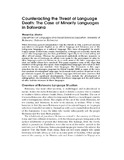Counteracting the threat of language death: the case of minority languages in Botswana

View/
Date
2006-03Author
Mooko, T.
Publisher
Routledge. http://www.informaworld.comType
Published ArticleMetadata
Show full item recordAbstract
When Botswana gained independence from the British in 1966, a political decision was taken to designate English as an official language and Setswana, one of the indigenous languages, as a national language. This move disregarded the multilingual nature of Botswana society. Furthermore, although not explicitly stated, the use of other languages was, in effect, prohibited, especially in the school setting and other official arenas. Whereas the government undertook deliberate measures to promote the use of Setswana, no efforts were made by the government to cater for other languages spoken in Botswana. As a result, some of the latter languages have died out whilst others have survived. This paper examines some of the steps that members of the groups that speak these marginalised languages have taken in their quest to develop and maintain their languages. The discussion in this paper considers the six strategies proposed by David Crystal (2000) as some of the ways that speakers of endangered languages could ensure their survival. Deprived of any government support, the speakers of these languages initiated some processes that have seen some significant developments. These include the development of orthographies, the translation of the Bible into these languages and the publication of other written resources in these languages.
